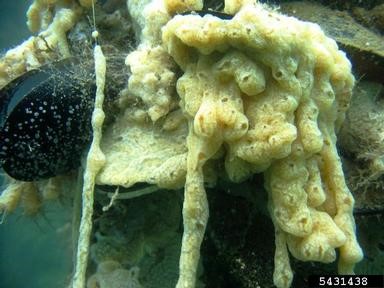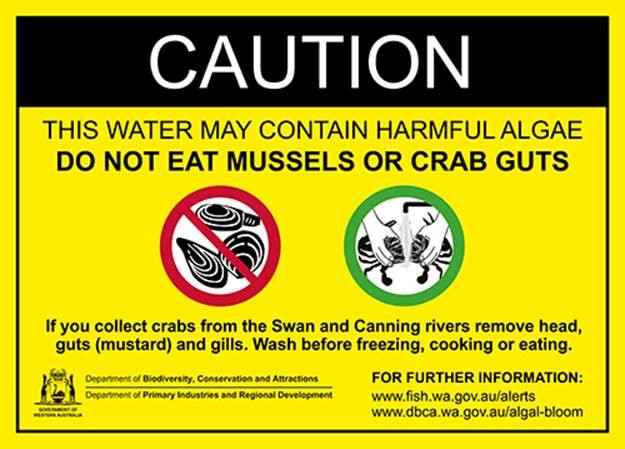Abalone Viral Ganglioneuritis (AVG) detection in wild abalone in South Australia
The abalone disease AVG is established in the wild in Victorian and Tasmanian waters and is expected to re-occur intermittently in these jurisdictions.
On 23 February 2024, the first case of AVG in South Australia was reported in wild abalone from waters of the southeast coast of South Australia. These waters are in relatively close proximity to Victorian waters where AVG is known to occur. More information is available on the Government of South Australia AVG webpage.
Key features of AVG
AVG is a viral disease affecting the nervous system of abalone resulting in weakness and death of the shellfish. There are no known or likely impacts for human health. AVG only affects abalone species.
AVG has not been reported from Western Australian abalone. If introduced into Western Australia (WA), AVG could have a severe impact on abalone in WA and WA’s important commercial, recreational and aquaculture abalone sectors.
To prevent introduction of AVG into WA, the import of live abalone into WA is not permitted. It’s also illegal to use abalone meat or any abalone material as fishing bait in WA.
Look out for and report disease signs in abalone
Industry and community members play a critical role in monitoring our aquatic environments for disease and pest threats, and reporting anything unusual.
Signs of AVG in abalone
- You may see patches of weak and/or dead abalone that are easily removed from or fall off the reef and cannot right themselves.
- There may be clusters where there are only empty shells present (evidence of abalone that have died and been scavenged)
- In some abalone you may see swelling of the mouth parts or edges of the foot curling inwards, leading to exposure of clean shiny shell, but this is more common on farms.
How to report
- Report any signs of disease in abalone to the WA FishWatch 24-hour hotline on 1800 815 507.
- You may be asked to collect some whole abalone in a sealed plastic bag or container and record the exact location where the samples were collected. Samples should be kept refrigerated but not frozen.
Download or read the AVG fact sheet to learn more about:
- What is AVG?
- What are the signs of AVG in abalone?
- How is AVG spread?
- What you can do to help protect WA
- What to do if you see a sick abalone
More information about AVG
Carpet sea squirt
Carpet sea squirt (Didemnum vexillum) is an invasive marine pest that can overgrow and smother native species. It can overgrow rocks, shellfish, sea sponges and man-made structures such as wharves, jetty pylons, pontoons, buoys and vessels.
CSS is a noxious fish listed under the Fish Resources Management Act 1994 and a declared pest under the Biosecurity and Agriculture Management Act 2007.
It is native to east Asia, likely Japan, and has been introduced to New Zealand, North America and Europe.
The aquatic pest has been detected in two locations in WA; HMAS Stirling Garden Island and at the Australian Marine Complex at Henderson. The detection at HMAS Stirling Garden Island was the first confirmed detection in Australia. Visit the DPIRD website to find out more.
What can I do to prevent CSS from spreading in WA?
Recreational boaters, fishers and divers can assist in stopping the spread of marine pests and aquatic disease by keeping their boats, trailers, wetsuits and equipment clean.
When you clean your equipment, make sure that any bait, debris and seaweed is removed and not returned to the water. Check wheel arches on trailers, boat propellers, fishing tackle and footwear. Do not clean in the water or allow run off to enter the ocean.
Use soapy water to clean your boat and trailer, fishing rods and other equipment, and allow them to dry completely before using them at another location, even if it is on the same day.
There are many native species that look like carpet sea squirt so expert taxonomic identification and molecular techniques are required to confirm the identity of the species.
If you find unusual marine species attached to vessels, sub-merged infrastructure or in the marine environment, contact our aquatic pest biosecurity team through Fishwatch on 1800 815 507 or email them at
aquatic.biosecurity@dpird.wa.gov.au.
More information

Alexandrium health warning
In recent years there have been two unprecedented blooms of toxic dinoflagellate algae, Alexandrium spp., in the Swan and Canning rivers.
Alexandrium algae produce paralytic shellfish toxins (PSTs) which can be concentrated by filter feeding shellfish. These toxins are known to affect a wide range of species and may bio accumulate, resulting in potential impacts on crabs, fish, birds and mammals.
Human consumption of shellfish containing high levels of PSTs can result in poisoning and may cause death. Freezing and normal cooking processes do not destroy these PSTs.
Please do not eat mussels and remove the head, guts (mustard) and gills from blue swimmer crabs caught by recreational fishers in the Swan and Canning rivers, before freezing, cooking or eating them. All crabs must still be landed and transported whole to your home (your principal place of residence) unless you plan to eat them immediately.
Please see below resources related to Alexandrium algal blooms.
How to clean blue swimmer crabs flyer, available in five languages:
 How to clean blue swimmer crabs video
How to clean blue swimmer crabs video
 Alexandrium FAQs
Alexandrium FAQs
 Alexandrium algal bloom information
Alexandrium algal bloom information
 Alexandrium blooms monitoring
Alexandrium blooms monitoring
 Blooming surprise Landscope article March 2021.pdf
Blooming surprise Landscope article March 2021.pdf
Look out for caution signs installed at key Swan Canning Riverpark locations including jetties, traffic bridges, boat ramps and popular fishing locations.

Don’t dump ornamental fish
Protect the environment – don’t release aquarium fish into Western Australia’s sensitive waterways.
Aquarium fish that are not native are often more aggressive than native species and can outcompete them, consuming their food and taking up their space. They can also spread disease, kill local species and damage natural habitats.
This is especially important for our cave karst system in the Cape Range Peninsular near Exmouth, where there are rare cave-dwelling species found nowhere else on earth. Having evolved in isolation, these creatures are particularly vulnerable to introduced species. The Department of Primary Industries and Regional Development and Department of Biodiversity, Conservation and Attractions have been working together to eradicate introduced fish from caves and pools in the Cape Range region to protect our unique cave species. However, for their long-term survival, further introductions must also be prevented.
If your fish are healthy but you no longer want them, give them to a pet shop, other fish owners or an organisation with an aquarium. You could also advertise them on a local notice board or on social media.
If you can’t find a new home for your fish, or if they are sick or diseased, dispose of them humanely.
If you see ornamental fish in our waterways, you can help us protect WA’s aquatic environment by emailing Aquatic.Biosecurity@dpird.wa.gov.au, or calling FishWatch 1800 815 507.
For more information, check our handy guides:
Steinhausia species in shellfish
Steinhausia species are microsporidian parasites that have been
reported worldwide, including in Australia, from a wide range of shellfish
species including mussels, flat oysters, cockles and oysters.
Steinhausia species have been found in wild and cultured
shellfish species in the Kimberley, Pilbara, Gascoyne, Perth Metropolitan and Great
Southern regions.
It is unknown whether Steinhausia
can cause significant disease or under what circumstances it may cause disease.
Infection with Steinhausia is
not usually reported as the primary cause of mortality in shellfish. This is due to limited understanding of Steinhausia species lifecycle and the extent of the
shellfish species they may infect.
Key features of Steinhausia and its spread
Steinhausia species are reported to infect the ova (eggs) of female shellfish.
Infection with Steinhausia
is often reported to have a minimal effect on their shellfish host. However in some
cases, infection is associated with inflammation of the ovary, and heavy
infections may affect the fecundity (reproduction) of infected shellfish.
Steinhausia is likely spread when parasite spores are released
with eggs during spawning and are ingested by a suitable host. The complete lifecycle
of Steinhausia species is unknown, and it is unclear whether an
intermediate host is required for transmission to the final shellfish host. The environmental
and host conditions that can lead to signs of disease are also still to be
understood
Diagnosing Steinhausia
Steinhausia is currently identified based on the parasite’s appearance/structure
by observing stained ovary tissue sections under a light microscope or electron
microscope.
Infection with Steinhausia
may be associated with an abnormal appearance of the ovary, including depressed
creamy patches, spots or visibly raised areas.
There is currently no
molecular diagnostic method (such as a PCR test) available to detect the
parasite. DPIRD will continue to work with industry to consider future research
needs in relation to Steinhausia species in WA, including the
development of a molecular test for the parasite.
How to report
Other diseases that
may resemble infection with Steinhausia species include the protozoan
parasite Marteilioides chungmuensis, which is exotic to Australia. Producers
or members of the public who observe shellfish with unusual signs of disease in
Western Australia, including those described above (e.g. depressed creamy patches, spots or raised areas), should contact the FishWatch 24-hour hotline on 1800
815 507.
Other biosecurity alerts
Current biosecurity alerts are listed below. Fishers are asked to look out for these pests and to report evidence of them to FishWatch.
Marine pest alerts
 Asian green mussel
Asian green mussel
 Asian paddle crab
Asian paddle crab
 Black-striped mussel
Black-striped mussel
 European green crab
European green crab
 Japanese kelp
Japanese kelp
 Northern pacific seastar
Northern pacific seastar
 Redclaw crayfish
Redclaw crayfish
 Spangled perch
Spangled perch
Disease alerts
 White spot disease in prawns
White spot disease in prawns
 Indistinct river shrimp
Indistinct river shrimp
 Asian green mussel
Asian green mussel